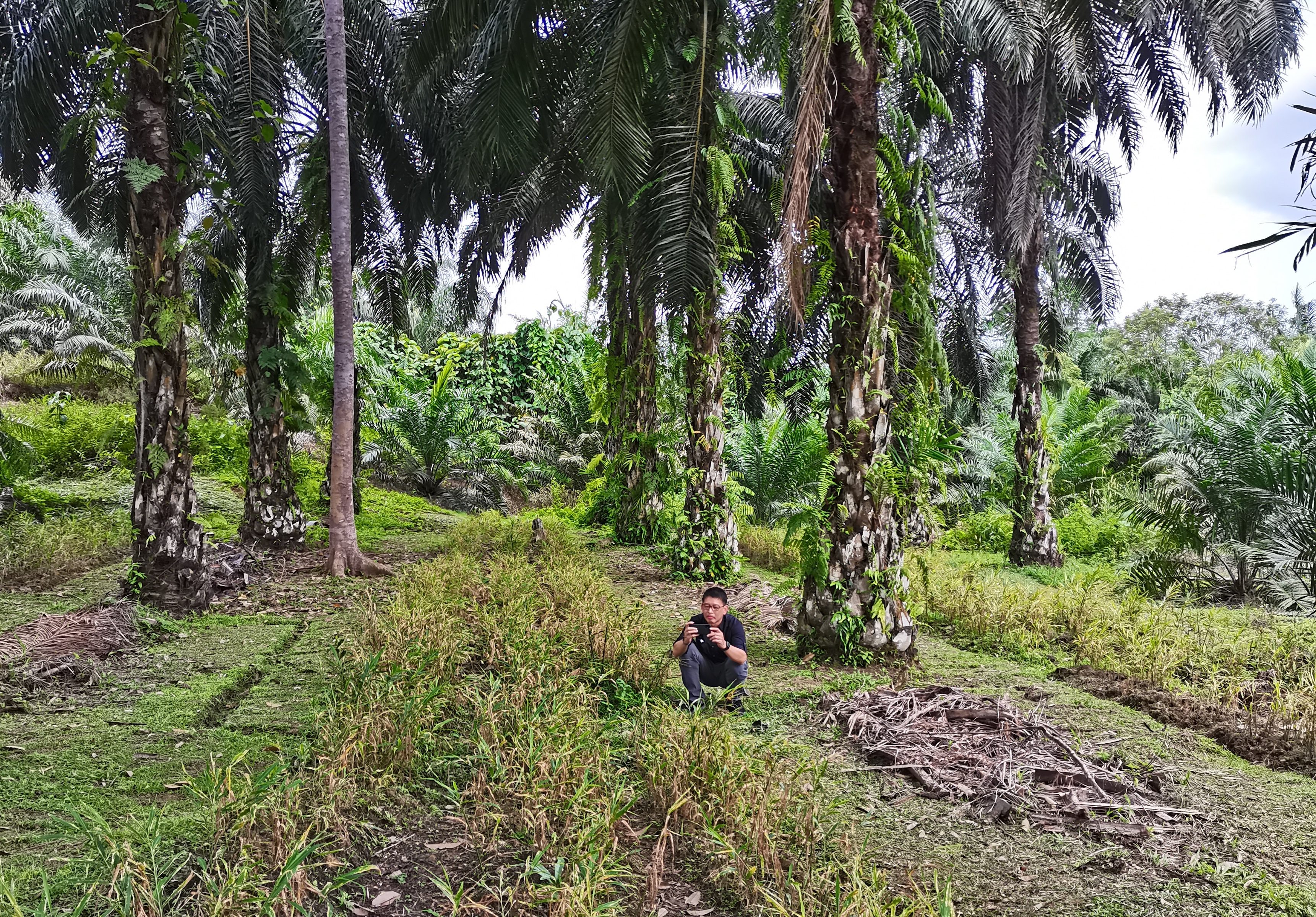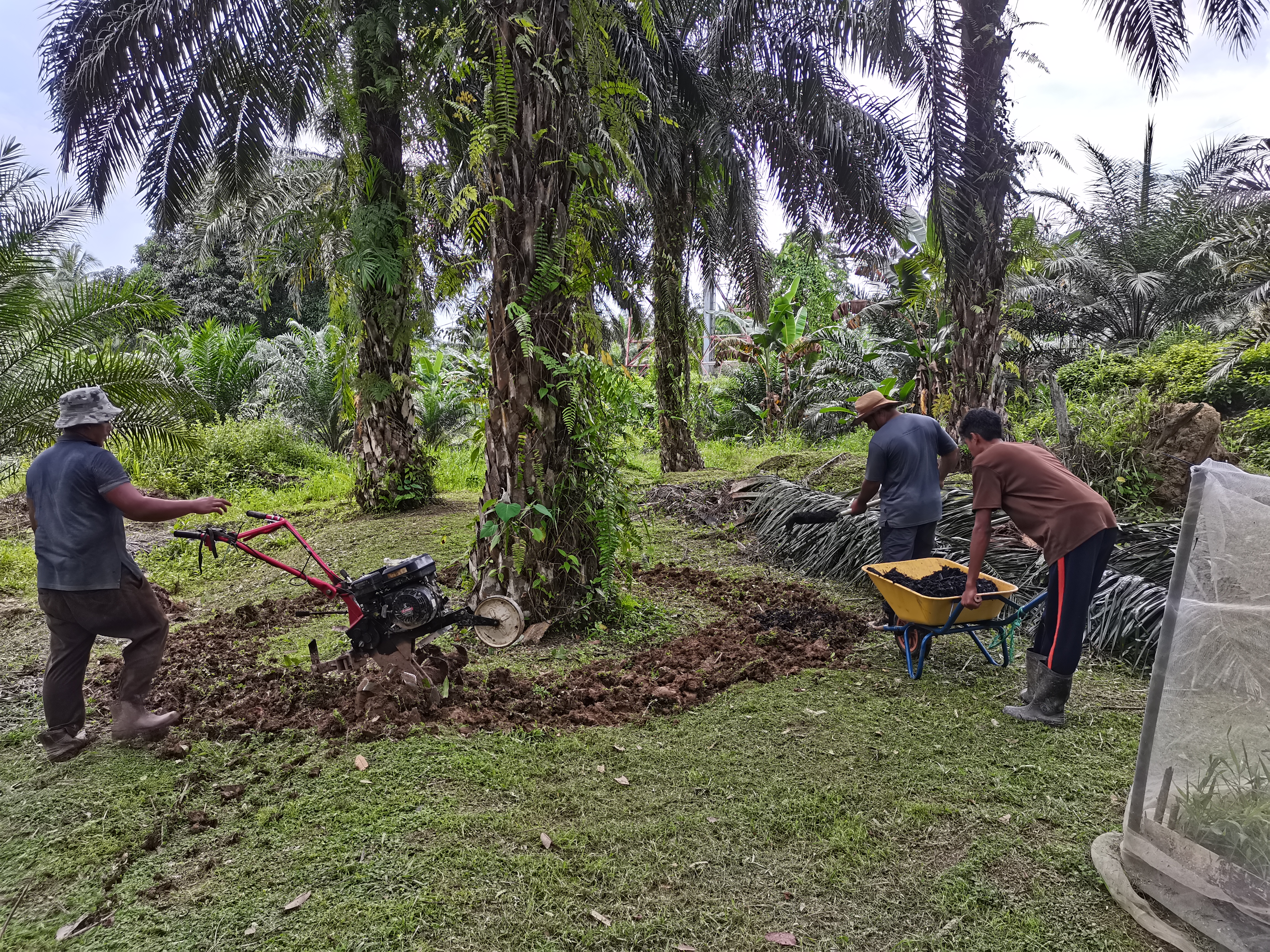This World Food Day, learn how the Food Systems, Land Use and Restoration (FOLUR) impact program in Sabah, Malaysia, is enhancing integrated landscape management systems for the benefit of people and planet.
Palm Oil Production in Sabah, Malaysia, and what it means for Water and Food Security
October 16, 2023
Authors: Ka Han Lee, Andrea Egan and Lalitha Monisha
Around 90% of the world's oil palm trees are grown on a few islands in Malaysia and Indonesia – islands that are perhaps most noteworthy for possessing the most biodiverse tropical forests found on Earth. In these ecologically singular places, there is a direct relationship between the expansion of palm oil estates and deforestation. In many cases, the logging necessary for palm oil plantations comes at the cost of degradation or losses to forest and peatland habitats.

Palm oil bunch, harvested in Malaysia. The oil is used in food manufacturing, beauty products, and as biofuel.
Using land wisely
Malaysia’s food system is shaped by agriculture and commodity production — one where the palm oil industry largely dominates. The palm oil industry has grown into a major economic force in the country; it is its fourth largest contributor and an employer to nearly a million people. Production of this commodity and other agriculture products are intricately linked through land use systems and rural livelihood generation.
As with many things in life — from food to forests, water is at the core of this work.

Pictured here a mixed crop farm, which grows both ginger and palm oil in the same plot of land in Sabah, Malaysia.
Palm oil and water
The theme for this World Food Day, 16 October 2023, is: ‘Water is Life, Water is Food. Leave No One Behind’. The theme aims to highlight the critical role of water for life on earth, and water as the foundation of our food. It also seeks to raise global awareness about the importance of managing water wisely as rapid population growth, economic development, urbanization, and climate change threaten water availability.
More broadly, World Food Day promotes awareness of hunger and action for the future of food, people, and the planet.
Water waste
The effects of palm oil are more than simply clearcutting forests and draining peatlands; the refining process also entails environmental costs: a palm oil mill generates 2.5 tonnes of effluent for every tonne of palm oil it produces. Direct release of this effluent can cause freshwater pollution, which affects downstream biodiversity and the people dependent on it. While oil palm plantations are not large users of pesticides and fertilizers at the individual plant level, monocropping and industrial-scale plantations can result in polluted surface and groundwater sources.
Functioning ecosystems and sustainable agriculture are key to managing water resources. Unfortunately, deforestation, poor land-use planning and management, and intensive agricultural practices leads to degraded water resources and erosion.
Water unhinged
Erosion occurs when forests are being cleared to establish plantations, and can also be caused by planting trees in unsuitable locations. The main cause of erosion is the planting of oil palms on steep slopes. Erosion causes increased flooding and silt deposits in rivers and ports. Eroded areas require more fertilizer and other inputs, including repair of roads and other infrastructure, further exacerbating the economic and ecological costs associated with the industry.

Harvested mushrooms
Putting nature at the heart of development
Supporting solutions that work for people and for planet, UNDP recognizes that it is critical to safeguard the natural capital that underpins our well-being, our economies and our societies. Putting nature at the heart of development, we are working with governments and people around the world to secure a better, more sustainable, more equitable future.
Part of this support is through our Nature Pledge — our commitment to upscale support to over 140 countries under the Global Biodiversity Framework and the Sustainable Development Goals.

Palm leave and bark being transformed into charcoal, which can be used as fertilizer in Sabah, Malaysia.
Supporting sustainable farming
In Malaysia, UNDP, in partnership with the Sabah Forestry Department (with financing from the Global Environment Facility and co-financing from partners) is responding to the issues facing the palm oil industry under the Food Systems, Land Use and Restoration (FOLUR) impact program in the state of Sabah.
The project is promoting integrated approaches, addressing negative externalities in palm oil production landscapes, and promoting deforestation-free supply chains for palm oil at the landscape, jurisdictional, state, national, and transnational (regional) levels.
It is also anchored by multi-stakeholder collaboration, leveraging public-private-community partnerships that promote responsible value chains for the state and nation’s palm oil industry and participatory conservation and restoration. This includes responding to the drivers of deforestation and forest degradation, especially agricultural expansion, logging, infrastructure development and mining, which have led to the loss of forest cover, increased greenhouse gas emissions, and biodiversity losses.

Biocharcoal to be used as fertilizers
The project works via several interlocking strategies. First, the project works to breathe new life into degraded landscapes. This rejuvenation is achieved through tree planting, the encouragement of agroforestry, and the adoption of sustainable land use practices. One of the outcomes of this program is the adoption of three restoration and rehabilitation planning frameworks for key intervention areas (including pathways for women participation).
Secondly, the project recognizes the importance of a strong institutional framework and stakeholder participation enabled for effective landscape management. The program’s outcomes will be championed by conducting multi-stakeholder engagement at state and local levels, accelerating the jurisdictional approach in Sabah, and diversifying and improving agricultural practices to improve smallholder livelihoods.
Promoting responsible value chains
On the final point, the program aims to empower smallholders and medium-sized growers. The program recognizes that investments and subsidies are vital to promote agriculture, to balance the footprint of oil palm and other commodities, and to improve smallholder livelihoods. To this end, the program aims to increase the resilience of smallholders towards price fluctuation through diversification of crops and agroforestry practices.
The project will also help facilitate increased awareness regarding subsidy and microcredit programmes, as well as build capacity of smallholders for accessing such programmes and managing the funds. Project resources are also allocated for supporting field interventions on improved soil and water management, restoration of degraded cropland, good agricultural and agroforestry practices, diversification, high quality seedlings and other yield-improvement and yield-resilience practices, such as pest management.
Another key component of the program is the promotion of responsible value chains for palm oil. Traceability of oil palm in Sabah will be strengthened to facilitate responsible sourcing, where government, private sector, and civil society partners will work together to assess existing traceability tools and provide recommendations for improvement.

Charcoal from palm leave and bark being used as fertilizer under the FOLUR impact program in Sabah, Malaysia.
Climate-smart and environmentally friendly
In the face of the global climate crisis, the project also takes on the mantle of enhancing climate change adaptation and mitigation. This is realized by emphasizing the restoration of degraded landscapes, which play a pivotal role in carbon sequestration and curbing greenhouse gas emissions.
The anticipated benefits of this endeavour are manifold. A significant outcome will be the expansion of forest cover, with a target to restore a staggering 200,000 hectares of degraded agricultural land and forest landscapes. This not only augments existing forest cover and bolsters the fight against climate change, but also acts as a bastion for biodiversity conservation.
With better management practices, the palm oil industry can provide benefits without threatening some of our most breath-taking natural treasures. When managed as a sustainable commodity, it can also also support enhanced water and food security. By implementing robust protection measures and strengthening institutional frameworks, the water-borne costs of palm plantations don’t have to come at the expense of rainforests.
For more information, please contact Ka Han Lee: ka.han.lee@undp.org
For more information on the FOLUR project, visit here.

 Locations
Locations



